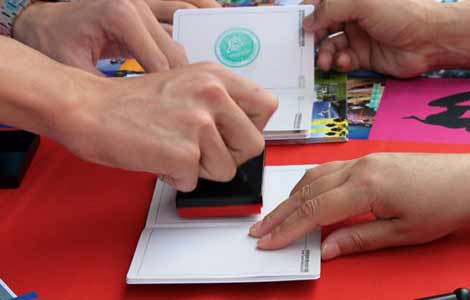Germans go to polls as Merkel bids for 3rd term
Updated: 2013-09-22 21:36
(Xinhua)
|
|||||||||||
![German Chancellor Angela Merkel poses as she casts her ballot during the German general election (Bundestagswahl) at a polling station in Berlin, September 22, 2013. [Photo/Agencies] Germans go to polls as Merkel bids for 3rd term](../../attachement/jpg/site1/20130922/d4bed9d4d22013a9379437.jpg) |
|
German Chancellor Angela Merkel poses as she casts her ballot during the German general election (Bundestagswahl) at a polling station in Berlin, September 22, 2013. [Photo/Agencies] |
BERLIN - Germans went to polls on Sunday for an election of a new parliament, as Chancellor Angela Merkel bids for her third term in office.
Some 61.8 million entitled voters were called to go to ballot boxes, and 34 parties will run in the election of Bundestag, lower house of German parliament.
For months, parties have been promoting themselves via various campaigns and posters in almost every street of the country.
Since early this month, a gaint poster over 1,000 square meters featuring incumbent chancellor Merkel's symbolic "rhombus" gesture has been standing at Berlin center railway station, hundreds of meters away from the chancellor's office. Another orange poster beside reads "Germany's future in good hands".
In the election, the ruling coalition consisting of Merkel's conservative Christian Democratic Union (CDU), its Bavarian sister party Christian Social Union (CSU) and the pro-business Free Democratic Party (FDP) faces challenges from another major party, the center-left Social Democrats (SPD) and its preferred partner, the Greens.
Merkel's main rival, SPD chancellor candidate Peer Steinbrueck cast his ballot at 9:30 (0730 GMT) in Bonn, two and a half hours after about 80,000 polling stations set in schools and other public buildings opened.
"The SPD was able to mobilize voters significantly in the last four weeks. That makes me happy ... I hope that it will be reflected in the results. I feel pretty good. I slept well," said the former finance minister.
At 13:30 (1130 GMT), Merkel voted in center Berlin with her husband, without giving any remarks.
Recent polls showed that the SPD has gained a higher approval rate of about 5 percentage points, compared with in last election in 2009. The CDU/CSU union remains in a leading postion, with an approval rate of about 10 points ahead of the SPD.
The union's partner FDP, however, was wiggling around the 5 percent threshold to enter the parliament.
Analysts said that a grand coalition of the CDU/CSU and the SPD as in Merkel's first term would be likely if the FDP failed to win any seat in the new Bundestag. Up to weeks of negotiations then might be need for forming a new government.
Another potential game changer in the election is the newly founded Alternative for Germany (AfD). Though just founded early this year, the anti-euro party has earned support rate of around 4 percent. The party argued that euro has been proven to be failed and wants countries to be allowed to leave the eurozone.
It gained more momentum after German Finance Minister Wolfgang Schaeuble said Greece might need a third bailout.
If the party managed to enter the legislature, more seats would be taken away from the CDU/CSU union. It would be more difficult for the center-right coalition to win a majority in the parliament, then the coalition between the union and the SPD would seem inevitable, despite Merkel's previous insist that she would continue her coalition with the FDP even if it has only a one-seat majority.
"The election is very important for Germany's future," said a female lawyer who came to a school ballot station in southeast Berlin, where German President Joachim Gauck voted at about 9:40 (0740 GMT).
"I think the result will be a grand coalition between the CDU/CSU and the SPD," said the middle-aged, refusing to give her name.
In the elections on Sunday, each voters could cast two votes: the first vote for a constituency candidate to represent his constituency in the parliament, the second for a party.
Half of the 598 parliament seats would be decided by the first votes, while each party's overall seats in the parliament would be allocated according to the share of second votes obtained.
A ruling party or coalition needs a majority of seats in the legislature.
"We hope the party we chose will develop green energy, protect Germany from involving in any war, and make sure that foreigners will be treated fairly here," said an elder teacher after voting together with his wife.
"The situation here seemed similar to that of last election," said Reinhard, director of a poll station in north Berlin. During the two hours after the station opened, some 150 of the overall 1,500 entitled voters have appeared.
In the station where Merkel balloted, 60 percent of entitled voters have turned out about six hours after the polls opened.
Exit polls results by research institutes are expected to be published shortly after the close of ballot stations at 18:00 (1600 GMT). Official provisional result, however, is scheduled to be released early Monday morning.
Related Stories
Merkel's allies win Bavaria state election 2013-09-16 10:44
Bavarians vote as Merkel looks for momentum 2013-09-16 08:24
Merkel in TV debate with rival before election 2013-09-02 05:45
Merkel attends German govt's open day in Berlin 2013-08-26 11:32
Today's Top News
Bo Xilai gets life in prison
New Sino-US ties sought
One Chinese killed in Nairobi attack
China prioritizes good-neighborly friendship
Trending news across China
China sees drop in donations
Russia demands DPRK explanation
Huawei to create 5,500 jobs in Europe
Hot Topics
Lunar probe , China growth forecasts, Emission rules get tougher, China seen through 'colored lens', International board,
Editor's Picks

|

|

|

|

|

|





